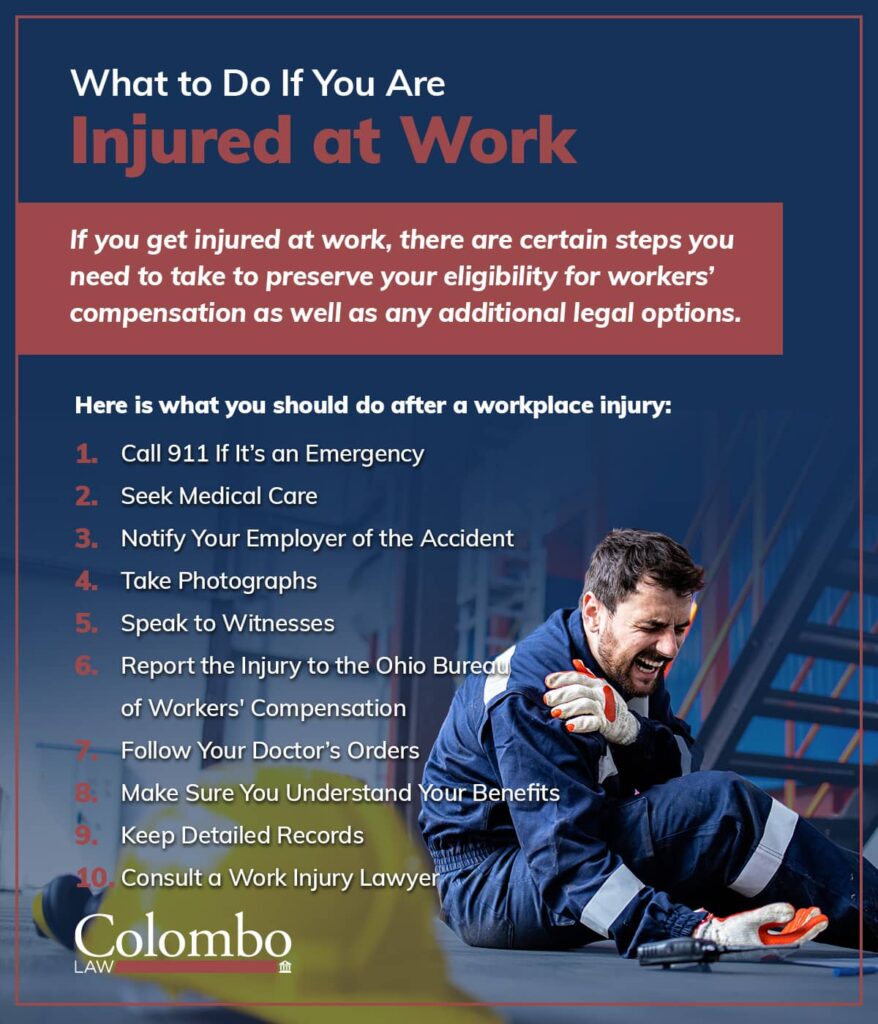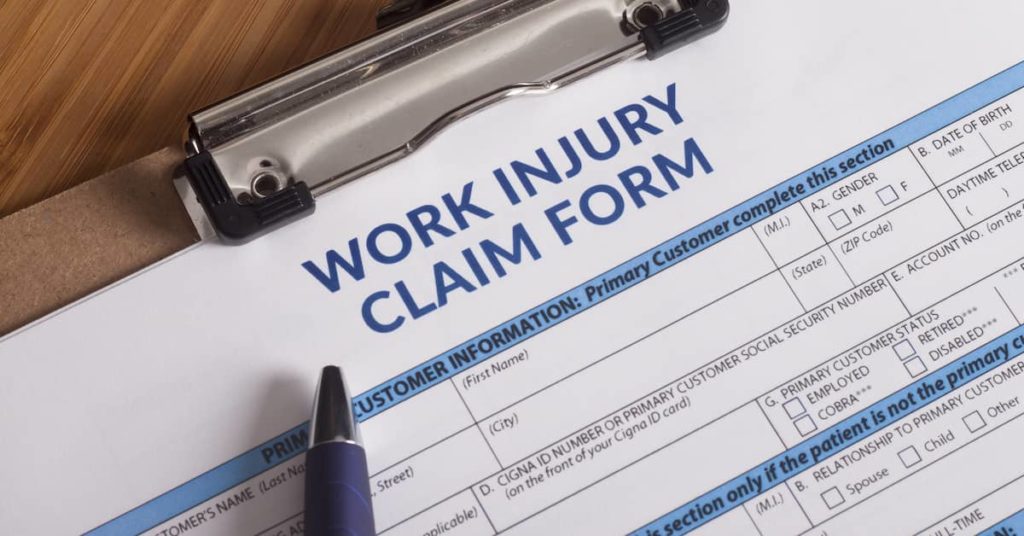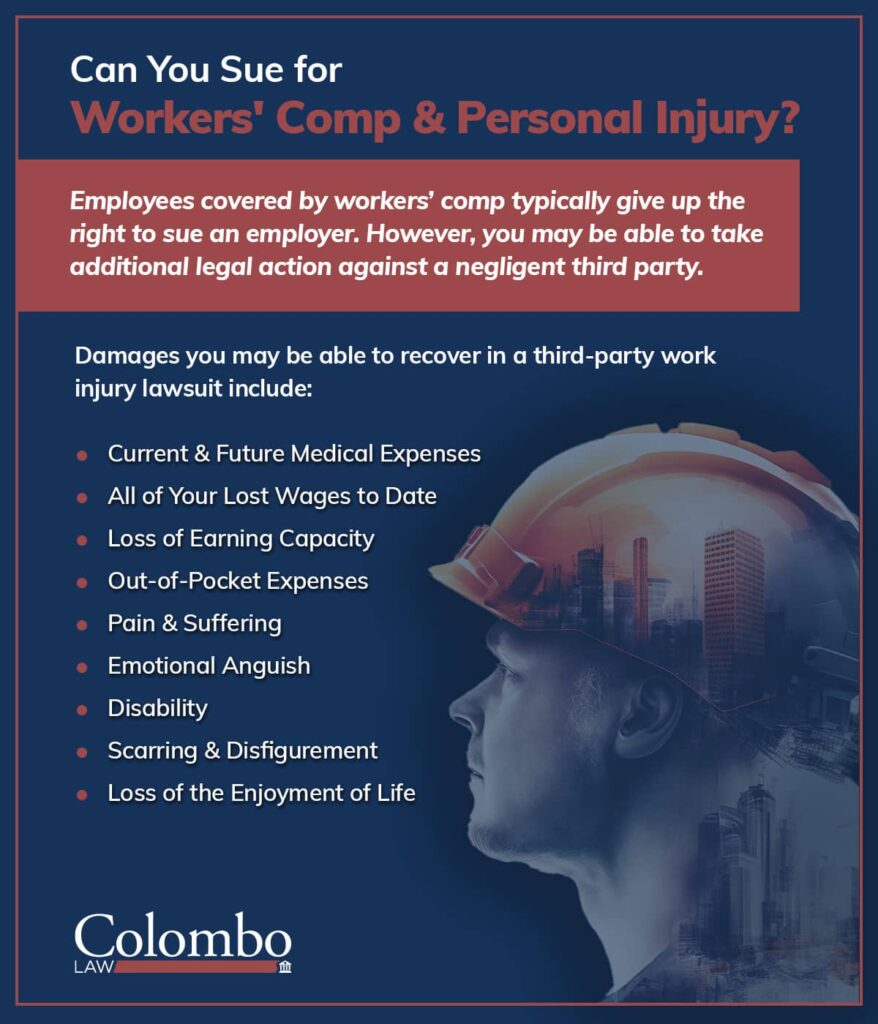Dedicated Ohio Workplace Injury Attorneys
Nobody goes to work expecting to get hurt. And yet, workplace injuries are an all-too-common occurrence in Ohio.
The U.S. Bureau of Labor Statistics recorded a total of 85,300 work-related injuries and illnesses among private employers in Ohio in 2020 (the most recent year of data). Nearly 60% of these work injuries and illnesses were classified as serious, requiring time away from work, restricted duty, and/or transfer to another position.
Employees who sustain injuries or get sick at work are generally entitled to workers’ compensation benefits. In some cases, you may also be able to file a work injury lawsuit.
Colombo Law can help you explore all of your options for recovering compensation after a work-related accident. Please call (614) 362-7000 today for a FREE consultation with a Columbus work injury lawyer.
What to Do After a Workplace Injury
If you get injured at work, there are certain steps you need to take to preserve your eligibility for workers’ compensation as well as any additional legal options. Here is what you should do after a workplace accident:
1. Call 911 If It’s an Emergency
If you are seriously injured, you need to get treatment right away. Either call 911 yourself or have a coworker, manager, or supervisor make the call for you.
Wait for the paramedics to arrive. You may need to be taken to the emergency room right away.
2. Seek Medical Care
Your well-being after a workplace accident is still crucial even in the event of a non-emergency work accident. Depending on the circumstances, you should do one or both of the following:
- Seek first aid for your injuries on the job
AND/OR - Go to an emergency room or urgent care clinic on your own (or have a trusted coworker take you)
For your first visit, you can see any doctor of your choice. However, followup care must be provided by a physician who is certified by the Ohio Bureau of Workers’ Compensation (BWC).
3. Notify Your Employer of the Accident
Reporting a work-related accident to an employer generally has two parts. First, you should inform a supervisor or manager that you have been hurt. Ideally, this should be done before you leave the workplace for medical care.
Second, you will be asked to complete a form describing the accident. Filling out this form can be a daunting prospect, but just be honest and stick to the facts.

4. Take Photographs
Pictures can tell the story of how you got hurt on the job and what contributed to your injuries. If nothing else, photos can help to establish that you were injured at work (which can help prove that you are entitled to workers’ compensation). Photos you take of any dangerous conditions, products, or other safety issues may also support a third-party work injury lawsuit.
5. Speak to Witnesses
The testimony of anyone who saw you get hurt at work can support your claim. Ask coworkers and bystanders what they saw and hold onto their contact information.
6. Report the Injury to BWC
Multiple parties may report a work-related injury or illness to the Ohio Bureau of Workers’ Compensation. This could include the worker, the employer, the employer’s workers’ comp insurer, a physician who treats the injured worker, or the managed care organization (MCO) the employer partners with to help manage medical treatment for employees who are hurt on the job. Often, the MCO is the entity that reports the work injury to the state.
However, you need to be prepared to report the injury to BWC yourself. This is especially true if you work for a self-insured employer (i.e., a business or company that administers its own workers’ comp program).
7. Follow Your Doctor’s Orders
It is crucial to abide by the course of treatment laid out by your doctor and/or your employer’s MCO. Sticking to the care plan increases the likelihood of recovery from your work injury while also ensuring that you don’t do anything to jeopardize your workers’ comp benefits.
8. Make Sure You Understand Your Workers’ Compensation Benefits
Review by the BWC takes up to 28 days once a workers’ compensation claim is filed. If your claim is approved, the BWC will send you a letter outlining what benefits will be paid.
It is crucial to know what is included in your workers’ comp benefits. You also need to know your rights if your workers’ compensation claim is denied.
Read More: What Can a Workers’ Compensation Lawyer Do for Me?
9. Keep Detailed Records
You need to hold onto any and all documents related to your work injury and workers’ compensation claim, including:
- Letters and notes from doctors and other medical professionals involved in your case
- Your medical records
- Communications with your employer, the insurance company, the MCO, etc.
- Information from the BWC about your claim
- Receipts for any expenses you pay out of pocket
- A record of the time you miss from work and the wages you would have earned (this can be shown through pay stubs)
- Documentation of issues such as pain, mobility issues, loss of function, psychological injury, etc.
Staying organized is the best way to manage your workers’ compensation claim. If you need to consult an attorney about your case, having all documents, records, etc. in one place is helpful as well.
10. Consult a Columbus Work Injury Lawyer
There are many advantages to retaining an attorney after a workplace injury. Workers’ compensation law is complicated, and knowledgeable workplace injury lawyers can help protect your rights and ensure that you get the full benefits you deserve.
Read More: What to Do If You Are Injured at Work
What Is Considered an On the Job Injury?
Job-related injuries can take many different forms. Some are obvious, such as a broken arm sustained by a worker who falls off a ladder. In other cases, however, the connection to your work must be determined through medical examination (e.g., repetitive stress injuries).
Colombo Law helps workers who suffer a wide range of injuries on the job, including:
- Strains, sprains, and other soft tissue injuries
- Bone fractures
- Lacerations
- Traumatic brain injuries
- Eye injuries and vision loss
- Work-related hearing loss
- Neck and back injuries (including damage to the spine and spinal cord)
- Burn injuries
- Amputation injuries
- Respiratory illnesses and other conditions linked to toxins in the workplace
Our Columbus work injury lawyers serve clients in multiple industries. We are especially proud to represent hard-working individuals in the oil and gas industry who have suffered serious injuries helping to heat and power Ohio’s homes.

Who Is Entitled to Workers’ Compensation?
Your injuries must be substantially related to your employment to qualify for workers’ compensation. Situations where a worker is generally entitled to benefits include injuries arising from:
- Regular job-related activities
- Use of a tool, machine, or other product in the course of your work
- Traveling as part of your job
- Work you are performing on premises owned and/or operated by someone else
Additionally, you must be classified as an employee to be eligible for workers’ compensation benefits. Independent contractors are not considered employees, so they are not entitled to workers’ comp.
Sometimes employers will misclassify employees as independent contractors in an effort to avoid paying workers’ comp premiums and other related costs. A Columbus work injury attorney can review the details of your employment and seek coverage of your injuries.
How Much Does Ohio Workers’ Comp Pay?
The benefits you are entitled to after a workplace injury vary based on how the accident affects your ability to work. Potential benefits in your workers’ compensation claim include:
- Coverage of all medical expenses related to the work injury
- Temporary total disability benefits (pays your full weekly wage for the first 12 weeks you are unable to work, followed by two-thirds of your average weekly wage)
- NOTE: Temporary total disability benefits only become available if the worker is unable to work more than 7 days after the injury
- Wage loss benefits (replaces two-thirds of your pre-injury wages if you are unable to work at full capacity)
- Permanent partial disability benefits (pays two-thirds of your average weekly wage if you suffer a “scheduled loss” as defined by Ohio Revised Code § 4123.57(B))
- Permanent total disability benefits (per the BWC, a permanent total disability award is “based on the injured worker’s average weekly wage that was in effect at the date of injury and the statewide average wage” if a worker is rendered totally unable to work)
In addition, families who lose loved ones in work accidents and/or to work-related illnesses can apply for a death benefit through workers’ compensation. Also known as a survivor benefit, death claims pay a portion of the income the worker made prior to death. This benefit can help to offset the enormous economic impact that the death of a provider has on the worker’s surviving spouse and/or dependents.
These are not the only benefits available through workers’ comp. Our Columbus work injury lawyers can assess your eligibility for workers’ compensation and ensure that you are paid all of the benefits you deserve.

Read More: How Much Do You Get If You Get Injured at Work?
Can I Sue for a Work-Related Injury Outside of Workers’ Compensation?
Workers’ compensation operates on the principle of no fault. Employees covered by workers’ comp typically give up the right to sue an employer in exchange for the benefits available through the employer’s workers’ compensation insurance.
However, in certain situations you may be able to take additional legal action and pursue compensation beyond the benefits available through workers’ comp. Scenarios where you may be able to file a work injury lawsuit include:
- You were injured on the job due to the negligence of a third party, such as a contractor or subcontractor, a careless motorist, etc.
- You suffer injury due to the negligence of the owner of the premises where you are working
- Your employer does not carry the legally required workers’ compensation insurance; this exposes employers to liability when their negligence causes injury to workers
- Your employer intentionally put you in harm’s way
- You suffered a job-related injury as a result of a defective product
- You were exposed to asbestos or another hazardous material in the course of your work
An employer may also be sued if it denies a legitimate workers’ compensation claim in bad faith. “Bad faith” means the employer knowingly denies the claim for dishonest or deceptive reasons (e.g., lying about the cause of the accident, falsely claiming the worker’s injuries are self-inflicted, etc.).
It is crucial not to assume that workers’ compensation is your only option. A Columbus work injury lawyer can evaluate your case and determine if one or more additional parties may be held liable for a workplace accident.

Read More: Can I Sue My Employer for an Injury on the Job?
When Can I Sue for a Workplace Injury?
Generally, your right to sue after a workplace injury is contingent on your ability to prove that the negligence of one or more parties caused you to suffer harm on the job. Evidence must be collected as soon as possible to ensure that your legal rights are protected.
In Ohio, a third-party work injury lawsuit is governed by the same statute of limitations as other types of personal injury claims. Generally, you have 2 years from the date of the injury to sue (see Ohio Revised Code § 2305.10).
Families of workers who are killed on the job also have a limited time to take action if negligence was involved. Generally, a wrongful death claim in Ohio must be brought no more than 2 years after the death of a relative (see Ohio Revised Code § 2125.02).
Read More: How Long Do I Have to Sue for Work-Related Injuries?
What Compensation Can I Recover in a Work Injury Lawsuit?
Damages recoverable in a third-party work injury lawsuit are not subject to the same restrictions as a workers’ compensation claim. Indeed, you can pursue compensation for all of your losses if you can show that one or more negligent third parties caused you injury on the job.
At Colombo Law, our work injury attorneys are committed to recovering maximum compensation on your behalf after a workplace accident. Damages we may be able to recover in a work injury lawsuit include:
- Current and future medical expenses
- All of your lost wages to date
- Loss of earning capacity
- Out-of-pocket expenses, including travel to medical appointments, assistive devices, modifications to your home and vehicle, household services and medical care, etc.
- Pain and suffering
- Emotional anguish
- Disability
- Scarring and disfigurement
- Loss of the enjoyment of life
Personal injury cases are entirely different from workers’ compensation claims. Although the potential recovery is much greater, the burden of proof is much higher as well.
It is of the utmost importance to talk to a Columbus workplace injury lawyer as soon as possible if you were hurt or became sick on the job. Colombo Law will advocate fiercely on your behalf.

One of the factors that sets our firm apart is the willingness of our attorneys to go to court. We prepare every case as though it will go to trial. In the event that a fair settlement cannot be reached, we can file a work injury lawsuit on your behalf and pursue a favorable award in the courtroom as needed.
Contact a Columbus Work Injury Lawyer Today
Workplace injuries and illnesses can seriously impact your life. Recovery takes time, during which you might not be able to earn a living. In serious cases, you might never be able to return to your previous employment or perform work of any kind.
Colombo Law can help you protect your rights after a work injury. Our lawyers seek to understand all of the ways the work injury affects you and your family. We recognize that many workers are hesitant to seek legal counsel because of the perceived costs involved.
At Colombo Law, we make each client a No Fee Promise. You pay nothing for the initial consultation, and we only charge attorney fees if we secure a settlement or win at trial on your behalf.
For a FREE case review, please call Colombo Law at (614) 362-7000 today. Our Columbus work injury lawyers handle both workers’ compensation and third-party personal injury claims throughout Ohio.










